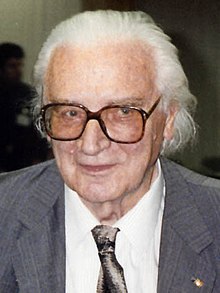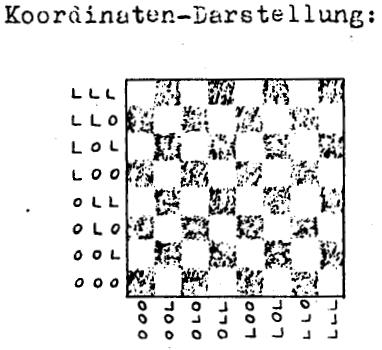Difference between revisions of "Konrad Zuse"
GerdIsenberg (talk | contribs) |
GerdIsenberg (talk | contribs) |
||
| Line 6: | Line 6: | ||
a German engineer and computer pioneer <ref>[[Jaap van den Herik]] ('''1990'''). ''An Interview with Konrad Zuse.'' [[ICGA Journal#13_2|ICCA Journal, Vol. 13, No. 2]]</ref>. His greatest achievement was the world's first functional program-controlled [https://en.wikipedia.org/wiki/Turing-complete Turing-complete] computer, the [https://en.wikipedia.org/wiki/Z3_%28computer%29 Z3], in 1941. Between 1943 and 1945 Zuse designed the high-level programming language [https://en.wikipedia.org/wiki/Plankalk%C3%BCl Plankalkül] <ref>[[Raúl Rojas]], [http://www.informatik.uni-trier.de/~ley/db/indices/a-tree/g/G=ouml=ktekin:C=uuml=neyt.html Cüneyt Göktekin], [http://www.icsi.berkeley.edu/%7Efractor/homepage/About_Me.html Gerald Friedland], [https://en.wikipedia.org/wiki/User:Mike_Kr%C3%BCger Mike Krüger], [http://www.inf.fu-berlin.de/groups/ag-ti/members/scharf.html Ludmila Scharf], [http://www.feinarbeit.de/ Olaf Langmack], [http://www.linkedin.com/pub/denis-kuniss/9/792/303 Denis Kuniß] ('''2000'''). ''[http://www.zib.de/zuse/Inhalt/Programme/Plankalkuel/Plankalkuel-Report/Plankalkuel-Report.htm Plankalkül: The First High-Level Programming Language and its Implementation]'', [[Free University of Berlin]]</ref> , first published about in 1948. Since 1941 Zuse worked on chess playing algorithms and formulated program routines <ref>[[Mathematician#Bauer|Friedrich L. Bauer]] ('''2000'''). ''[http://dl.acm.org/citation.cfm?id=351209.351223&coll=DL&dl=GUIDE&CFID=75486307&CFTOKEN=41804850 The Plankalkül of Konrad Zuse - revisited]''. in [http://www.lib.muohio.edu/multifacet/record/mu3ugb2811208 The first computers : history and architectures] edited by [[Raúl Rojas]] and [http://www.deutsches-museum.de/forschung/wissenschaftl-mitarbeiter/ebene1/ebene2/dr-ulf-hashagen/ Ulf Hashagen], [https://en.wikipedia.org/wiki/MIT_Press MIT Press]</ref> in Plankalkül in [[Timeline#1945|1945]]. | a German engineer and computer pioneer <ref>[[Jaap van den Herik]] ('''1990'''). ''An Interview with Konrad Zuse.'' [[ICGA Journal#13_2|ICCA Journal, Vol. 13, No. 2]]</ref>. His greatest achievement was the world's first functional program-controlled [https://en.wikipedia.org/wiki/Turing-complete Turing-complete] computer, the [https://en.wikipedia.org/wiki/Z3_%28computer%29 Z3], in 1941. Between 1943 and 1945 Zuse designed the high-level programming language [https://en.wikipedia.org/wiki/Plankalk%C3%BCl Plankalkül] <ref>[[Raúl Rojas]], [http://www.informatik.uni-trier.de/~ley/db/indices/a-tree/g/G=ouml=ktekin:C=uuml=neyt.html Cüneyt Göktekin], [http://www.icsi.berkeley.edu/%7Efractor/homepage/About_Me.html Gerald Friedland], [https://en.wikipedia.org/wiki/User:Mike_Kr%C3%BCger Mike Krüger], [http://www.inf.fu-berlin.de/groups/ag-ti/members/scharf.html Ludmila Scharf], [http://www.feinarbeit.de/ Olaf Langmack], [http://www.linkedin.com/pub/denis-kuniss/9/792/303 Denis Kuniß] ('''2000'''). ''[http://www.zib.de/zuse/Inhalt/Programme/Plankalkuel/Plankalkuel-Report/Plankalkuel-Report.htm Plankalkül: The First High-Level Programming Language and its Implementation]'', [[Free University of Berlin]]</ref> , first published about in 1948. Since 1941 Zuse worked on chess playing algorithms and formulated program routines <ref>[[Mathematician#Bauer|Friedrich L. Bauer]] ('''2000'''). ''[http://dl.acm.org/citation.cfm?id=351209.351223&coll=DL&dl=GUIDE&CFID=75486307&CFTOKEN=41804850 The Plankalkül of Konrad Zuse - revisited]''. in [http://www.lib.muohio.edu/multifacet/record/mu3ugb2811208 The first computers : history and architectures] edited by [[Raúl Rojas]] and [http://www.deutsches-museum.de/forschung/wissenschaftl-mitarbeiter/ebene1/ebene2/dr-ulf-hashagen/ Ulf Hashagen], [https://en.wikipedia.org/wiki/MIT_Press MIT Press]</ref> in Plankalkül in [[Timeline#1945|1945]]. | ||
| − | His [https://en.wikipedia.org/wiki/Calculating_Space Calculating Space] <ref>Konrad Zuse ('''1969'''). ''Rechnender Raum''. Braunschweig: Friedrich Vieweg & Sohn. [http://www.zib.de/zuse/Inhalt/Texte/Chrono/60er/Pdf/76scan.pdf pdf], ('''1970'''). ''[https://en.wikipedia.org/wiki/Calculating_Space Calculating Space]'', MIT Technical Translation AZT-70-164-GEMIT, [[Massachusetts Institute of Technology]] ([https://en.wikipedia.org/wiki/Project_MAC#Project_MAC Project MAC])</ref> started the field of [https://en.wikipedia.org/wiki/Digital_physics Digital Physics] in 1969, later popularized and extended by [[Edward Fredkin]], [[Jürgen Schmidhuber]] <ref>[http://www.idsia.ch/~juergen/digitalphysics.html Zuse's Thesis - Zuse hypothesis - Algorithmic Theory of Everything - Digital Physics, Rechnender Raum (Computing Space, Computing Cosmos) - Computable Universe - The Universe is a Computer - Theory of Everything] by [[Jürgen Schmidhuber]]</ref> and [ | + | His [https://en.wikipedia.org/wiki/Calculating_Space Calculating Space] <ref>Konrad Zuse ('''1969'''). ''Rechnender Raum''. Braunschweig: Friedrich Vieweg & Sohn. [http://www.zib.de/zuse/Inhalt/Texte/Chrono/60er/Pdf/76scan.pdf pdf], ('''1970'''). ''[https://en.wikipedia.org/wiki/Calculating_Space Calculating Space]'', MIT Technical Translation AZT-70-164-GEMIT, [[Massachusetts Institute of Technology]] ([https://en.wikipedia.org/wiki/Project_MAC#Project_MAC Project MAC])</ref> started the field of [https://en.wikipedia.org/wiki/Digital_physics Digital Physics] in 1969, later popularized and extended by [[Edward Fredkin]], [[Jürgen Schmidhuber]] <ref>[http://www.idsia.ch/~juergen/digitalphysics.html Zuse's Thesis - Zuse hypothesis - Algorithmic Theory of Everything - Digital Physics, Rechnender Raum (Computing Space, Computing Cosmos) - Computable Universe - The Universe is a Computer - Theory of Everything] by [[Jürgen Schmidhuber]]</ref> and [[Mathematician#SWolfram|Stephen Wolfram]] <ref>[https://en.wikipedia.org/wiki/Konrad_Zuse#Calculating_Space Konrad Zuse | Calculating Space from Wikipedia]</ref>. |
<span id="Plankalkuel"></span> | <span id="Plankalkuel"></span> | ||
=Plankalkül and Chess= | =Plankalkül and Chess= | ||
Revision as of 13:21, 24 August 2018

Konrad Zuse, (June 22, 1910 - December 18, 1995)
a German engineer and computer pioneer [2]. His greatest achievement was the world's first functional program-controlled Turing-complete computer, the Z3, in 1941. Between 1943 and 1945 Zuse designed the high-level programming language Plankalkül [3] , first published about in 1948. Since 1941 Zuse worked on chess playing algorithms and formulated program routines [4] in Plankalkül in 1945.
His Calculating Space [5] started the field of Digital Physics in 1969, later popularized and extended by Edward Fredkin, Jürgen Schmidhuber [6] and Stephen Wolfram [7].
Contents
Plankalkül and Chess
Images from Der Plankalkül, Kapitel 5, Schachtheorie [8]
Plankalkül, two squares (v0, v1) are adjacent, if they are not equal, and both absolute rank and file distance are less or equal than one (L), structural square indices written vertically
Zuse's 8x8 Board with three bit file, rank coordinates: a1 = 000, 000; e2 = L00, 00L
See also
Selected Publications
1940 ...
Early Chess related manuscripts from the Konrad Zuse Internet Archive
- Konrad Zuse (1941). Vorbereitung des Plankalküls, logische Formalismen, Schachspiel.
- Konrad Zuse (1941). Vorarbeiten zum Plankalkül. Schachprogramme.
- Konrad Zuse (1942). Ausarbeitungen zur Programmierung des Schachspiels.
1950 ...
- Konrad Zuse (1956). Große oder kleine programmgesteuerte Rechengeräte? Unternehmensforschung, Vol. 1, No. 1
- Konrad Zuse (1959). Über den Plankalkül.
1960 ...
- Konrad Zuse (1967). Über sich selbst reproduzierende Systeme. Elektronische Rechenanlagen, Vol. 9, No. 2
- Konrad Zuse (1969). Rechnender Raum. Braunschweig: Friedrich Vieweg & Sohn. (1970). Calculating Space. MIT Technical Translation AZT-70-164-GEMIT, Massachusetts Institute of Technology (Project MAC) [11]
1970 ...
- Konrad Zuse (1970). Der Computer mein Lebenswerk. Verlag Moderne Industrie, Wolfgang Dummer & Co., München. Second Edition (1990) published by Springer-Verlag, Berlin, Germany.
- Konrad Zuse (1972). Der Plankalkül. Bericht der Gesellschaft für Mathematik und Datenverarbeitung mbH, Bonn, Nr. 63, pp. 235-285, St. Augustin. Translation of the original version Der Plankalkül 1945 in English by Gerhard Overhoff, (1974) published with new comment, (1976) under the title: The Plankalkül. Bericht der Gesellschaft für Mathematik und Datenverarbeitung mbH, Bonn, Nr. 106, pp. 42-244, St. Augustin. Verlagsausgabe: Oldenbourg (1977), München. Second Edition (1989) published by R. Oldenbourg Verlag, München, Germany. Kapitel 5, Schachtheorie
- Konrad Zuse (1975). Vom Traum zür Wirklichkeit. Mitteilungen der Universität Dortmund, Sondernummer 12, pp. 4. Wiederabdruck in Erstes GI Computer-Schach-Turnier (ed. Reinhard Zumkeller). Dortmund (1975), pp. 48-49.
- Konrad Zuse (1975). Mathematische Logik und Informatik. GI Jahrestagung 1975
- Konrad Zuse (1975). Rediscovery of buried ideas from the pioneer age of computers. Computer Architecture 1975
- Konrad Zuse (1979). Petri-Nets from the Engineer's Viewpoint. Advanced Course: Net Theory and Applications 1979 [12]
1980 ...
- Konrad Zuse (1980). Installation of the German Computer Z4 in Zurich in 1950. IEEE Annals of the History of Computing, Vol 2, No 3
- Konrad Zuse (1982). The Computing Universe. International Journal of Theoretical Physics, Vol. 21, No. 6-7
- Konrad Zuse (1983). Der Computer und die Evolution menschlichen Denkens. Elektronische Rechenanlagen, Vol. 25, No. 6
1990 ...
- Konrad Zuse (1990). The Way from the Computers Z1, Z3 and Z4 to Plankalkül. ICCA Journal, Vol. 13, No. 2
- Jaap van den Herik (1990). An Interview with Konrad Zuse. ICCA Journal, Vol. 13, No. 2
- Bob Herschberg, Jaap van den Herik (1996). Konrad Zuse: An Obituary. ICCA Journal, Vol. 19, No. 1
- Raúl Rojas (1997). Konrad Zuse's Legacy: The Architecture of the Z1 and Z3. IEEE Annals of the History of Computing, Vol. 19, No. 2
- Brian J. Shelburne (1999). Zuse's Z3 Square Root Algorithm.
2000 ...
- Friedrich L. Bauer (2000). The Plankalkül of Konrad Zuse - revisited. in The first computers : history and architectures edited by Raúl Rojas, Ulf Hashagen, MIT Press
- Konrad Zuse (2008). Über den Plankalkül. (Reprint). Information Technology, Vol. 50, No 1.
2010 ...
- Raúl Rojas (2010). Konrad Zuse: 1910-2010. Information Technology, Vol. 52, No. 1
- Herbert Bruderer (2011). Konrad Zuse und die ETH Zürich. Informatik Spektrum, Vol. 34, No. 6 (German)
- Herbert Bruderer (2012). Konrad Zuse und die Schweiz - Wer hat den Computer erfunden. Oldenbourg Verlag (German)
- Raúl Rojas (2014). The Z1: Architecture and Algorithms of Konrad Zuse's First Computer. arXiv:1406.1886
- Raúl Rojas (2014). Konrad Zuse's Proposal for a Cipher Machine. Cryptologia, Vol. 38, No. 4
- Raúl Rojas (2016). The Design Principles of Konrad Zuse's Mechanical Computers. arXiv:1603.02396
- Raúl Rojas (2016). Babbage Meets Zuse: A Minimal Mechanical Computer. UCNC 2016
External Links
ZIB
- Konrad Zuse Internet Archive
- Konrad Zuse (1910-1995) by Raúl Rojas
- Das erste Schachprogramm der Welt
Bios
- Konrad Zuse Biography
- Konrad Zuse Biography by J. A. N. Lee, September 1994
- Konrad Zuse Biography © RT-Distribution
Schmidhuber
- Zuse's Thesis - Zuse hypothesis - Algorithmic Theory of Everything - Digital Physics, Rechnender Raum (Computing Space, Computing Cosmos) - Computable Universe - The Universe is a Computer - Theory of Everything by Jürgen Schmidhuber
Museums
- Zuse Extra: Der Computererfinder und seine Ideen from Heinz Nixdorf MuseumsForum
- Konrad Zuse from The Computer History Museum
Misc
- Experten-Workshop über Arbeiten deutscher Rechner-Spezialisten:: GMD: Abschied von der Hardware-Forschung?, July 12, 1979, Computerwoche (German) » SMS 201
- Rassenforschung am Rechner by Hilmar Schmundt, Spiegel Online, June 14, 2010
- From the Z1 to the Singularity – Zuse's 100th birthday by Frederic Friedel, ChessBase News, June 22, 2010
Computers
- Z1 (computer) from Wikipedia
- Z2 (computer) from Wikipedia
- Z3 (computer) from Wikipedia
- Z4 (computer) from Wikipedia
- Z5 (computer) from Wikipedia
- Z11 (computer) from Wikipedia
- Z22 (computer) from Wikipedia
- Z23 (computer) from Wikipedia
- Z25 (computer) from Wikipedia
- Zuse Z3 im Deutschen Museum München, YouTube Video
References
- ↑ Konrad Zuse, Photo by Wolfgang Hunscher, Dortmund, June 1992, Category:Konrad Zuse - Wikimedia Commons
- ↑ Jaap van den Herik (1990). An Interview with Konrad Zuse. ICCA Journal, Vol. 13, No. 2
- ↑ Raúl Rojas, Cüneyt Göktekin, Gerald Friedland, Mike Krüger, Ludmila Scharf, Olaf Langmack, Denis Kuniß (2000). Plankalkül: The First High-Level Programming Language and its Implementation, Free University of Berlin
- ↑ Friedrich L. Bauer (2000). The Plankalkül of Konrad Zuse - revisited. in The first computers : history and architectures edited by Raúl Rojas and Ulf Hashagen, MIT Press
- ↑ Konrad Zuse (1969). Rechnender Raum. Braunschweig: Friedrich Vieweg & Sohn. pdf, (1970). Calculating Space, MIT Technical Translation AZT-70-164-GEMIT, Massachusetts Institute of Technology (Project MAC)
- ↑ Zuse's Thesis - Zuse hypothesis - Algorithmic Theory of Everything - Digital Physics, Rechnender Raum (Computing Space, Computing Cosmos) - Computable Universe - The Universe is a Computer - Theory of Everything by Jürgen Schmidhuber
- ↑ Konrad Zuse | Calculating Space from Wikipedia
- ↑ Der Plankalkül, Kapitel 5, Schachtheorie, previously available from Konrad Zuse Internet Archive
- ↑ ICGA Reference Database (pdf)
- ↑ dblp: Konrad Zuse
- ↑ Konrad Zuse Der rechnende Raum. Feature-Skript von Constanze Kurz und Marcus Richter, Hörspiel-Werkstatt, October 2006 (German) pdf
- ↑ Petri net from Wikipedia

